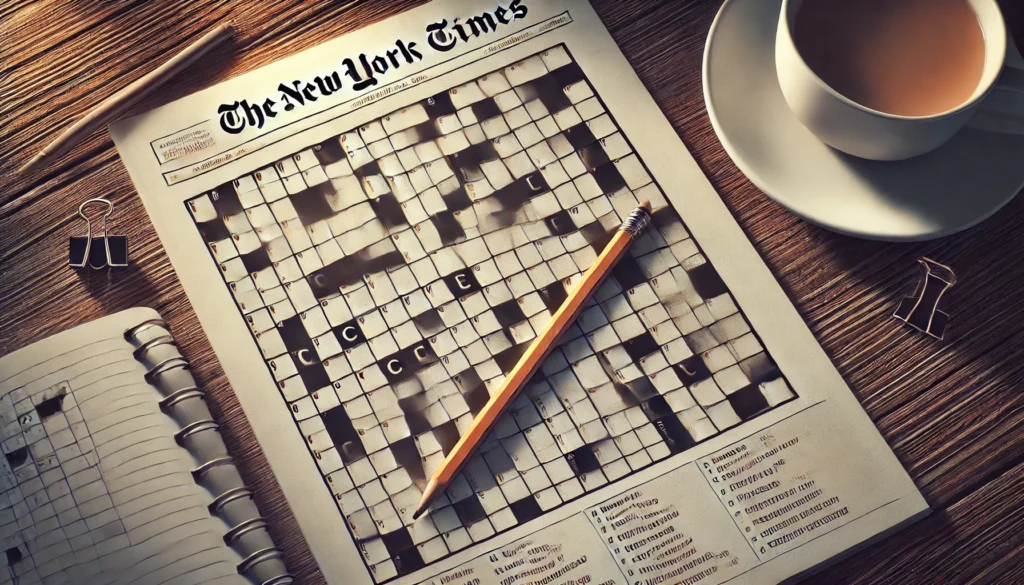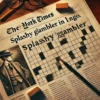Crossword puzzles, especially the New York Times (NYT) crossword, are renowned for their clever clues and cultural references. However, many solvers often find themselves stumped when they cannot decipher a particular reference. Crafting a response to not getting the reference NYT crossword can be both a learning opportunity and a satisfying challenge.
This guide explores why references in NYT crosswords can be tricky and offers strategies to improve problem-solving skills while embracing the joy of puzzles.
Understanding the NYT Crossword Puzzle Culture
The New York Times crossword puzzle is more than a pastime; it is a cultural institution. With clues drawing from literature, history, pop culture, and modern trends, solvers need both general knowledge and niche expertise to complete the grid.
Why Are NYT Crossword Clues So Challenging?
- Wordplay and Puns: Clues often use wordplay that requires lateral thinking.
- Cultural and Historical References: Many clues rely on knowledge of historical figures, events, or cultural phenomena.
- Obscure Vocabulary: Rare or archaic words are occasionally included.
- Multi-Layered Meanings: Some clues depend on double meanings, homonyms, or misdirection.
The variety of these elements ensures that even seasoned solvers may encounter stumbling blocks.
Common Reactions to Not Getting the Reference
When faced with an unfamiliar reference, solvers may respond in different ways.
Emotional Reactions
- Frustration: Feeling defeated by a challenging clue.
- Curiosity: An eagerness to learn more about the reference.
- Satisfaction: The joy of discovering the answer after research.
Behavioral Responses
- Looking Up Clues: Searching for answers online or in dictionaries.
- Collaborating: Consulting friends or crossword forums for hints.
- Skipping and Returning: Moving on to other clues and revisiting the tough one later.
These reactions highlight the dynamic process of solving puzzles while fostering continuous learning.
How to Overcome Reference-Related Challenges in NYT Crosswords
Response to Not Getting the Reference NYT Crossword. Dealing with tricky references requires a combination of strategies, research skills, and perseverance.
Practical Strategies for Tough Clues
- Break Down the Clue: Analyze each word to uncover hidden hints or themes.
- Use Crossword Tools: Leverage crossword solvers or anagram finders for assistance.
- Cross-Check Letters: Focus on intersecting clues to gather partial answers.
- Study Word Patterns: Pay attention to prefixes, suffixes, and common word structures.
Building Long-Term Skills
- Expand General Knowledge: Read articles, watch documentaries, or listen to podcasts on varied topics.
- Practice Regularly: Solve puzzles daily to improve pattern recognition.
- Learn Crossword-Specific Terms: Familiarize yourself with frequently used abbreviations and clichés.
These techniques make it easier to approach difficult references with confidence.
The Role of Pop Culture and Trivia in NYT Crosswords
NYT crossword puzzles frequently draw from pop culture, trivia, and recent events, making them both dynamic and contemporary.
Popular Themes in Crossword Clues
- Movies and TV Shows: Iconic lines, characters, or actors often appear.
- Music and Lyrics: Song titles and lyrics may serve as subtle hints.
- Historical Events: Dates, wars, and treaties can form the basis of clues.
- Literature and Art: Famous books, authors, and painters are recurring references.
Understanding these patterns helps solvers identify trends and make connections quickly.
Using Resources to Solve Difficult References
Modern technology and traditional tools provide invaluable assistance for crossword solvers.
Top Resources for Crossword Help
- Online Databases: Sites like Crossword Tracker and XWord Info offer searchable archives.
- Reference Books: Crossword dictionaries and thesauruses can clarify meanings.
- Mobile Apps: Tools like Crossword Solver provide instant answers.
- Community Forums: Platforms like Reddit and crossword blogs foster collaborative problem-solving.
How to Use Tools Without Cheating
- Focus on hints rather than complete answers.
- Treat research as a learning experience rather than a shortcut.
- Limit tool usage to particularly challenging clues.
These resources support solvers in enhancing their knowledge while keeping the puzzle-solving process engaging.
Learning from Mistakes in NYT Crosswords
Mistakes are an inevitable part of crossword solving and often pave the way for growth.
Common Mistakes and Lessons
- Misinterpreting Clues: Practice reading clues multiple ways to find alternate meanings.
- Guessing Incorrect Words: Double-check spellings and word patterns before finalizing answers.
- Overlooking Simplicity: Sometimes, the simplest answer fits best.
By analyzing errors, solvers can refine their strategies and approach puzzles more effectively.
Building Confidence in Crossword Solving
Confidence grows with practice, exposure, and an open mind.
Steps to Boost Confidence
- Start with easier puzzles before tackling the NYT crossword.
- Track improvements and celebrate small victories.
- Challenge yourself with themed puzzles to develop specific skills.
- Participate in crossword tournaments to test abilities in real time.
Over time, consistent effort leads to stronger problem-solving abilities and a deeper appreciation for wordplay.
Conclusion
Response to Not Getting the Reference NYT Crossword. Responding to not getting the reference in the NYT crossword can feel frustrating, but it also opens doors to learning and growth. With strategies like breaking down clues, using research tools, and developing broader knowledge, solvers can transform challenges into opportunities.
Whether you’re a novice or an expert, every puzzle brings the chance to discover something new. So, embrace the process, keep practicing, and enjoy the rewarding experience that crossword puzzles offer.
Frequently Asked Questions
What should I do if I don’t get the reference in the NYT crossword?
Take time to analyze the clue, use resources like crossword dictionaries, and revisit it later if needed.
Are online crossword solvers considered cheating?
Not necessarily. Many solvers use them as learning tools rather than shortcuts.
Why are NYT crossword clues so hard?
The puzzles often feature wordplay, cultural references, and obscure vocabulary to challenge solvers.
How can I improve my crossword-solving skills?
Practice regularly, expand your knowledge, and use online tools to assist with difficult clues.
Can crossword puzzles help with vocabulary?
Absolutely! They introduce new words and meanings, improving vocabulary and cognitive skills.
What resources are best for learning crossword patterns?
Websites like XWord Info, crossword dictionaries, and community forums provide excellent insights.
Also Read: 3509 Seaway Dr New Port Richey – A Complete Guide to Location and Opportunities



